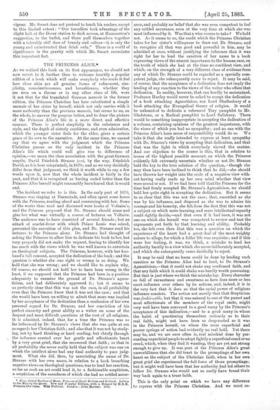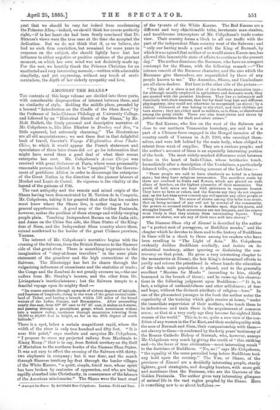THE PRINCESS ALICE.* As we noticed this book on its
first appearance, we should not now revert to it further than to welcome heartily a popular edition of a book which will make everybody who reads it feel how close akin are all genuine forms of refinement, simplicity, conscientiousness, and loveableness, whether they are seen on a throne or in any other class of life, were it not that for the translated German memoir in the former edition, the Princess Christian has here substituted a simple memoir of her sister by herself, which not only carries with it more authority than the previous memoir, but seems to us, on the whole, to apswer the purpose better, and to draw the picture of the Princess Alice's life in a more direct and effective manner. There is perfect simplicity in the substance and style, and the depth of sisterly confidence, and even admiration, which the younger sister feels for the elder, gives a certain grace of its own to the narrative. At the same time, we cannot say that we agree with the judgment which the Princess Christian passes on the only incident in the Princess Alice's life which could well give rise to difference of opinion,—we mean the close association with the great German sceptic, David Friedrich Strauss (not, by the way, Friedrich David, as it, is here misprinted), in 1870; and as we very decidedly differ from that judgment, we think it worth while to say a few words upon it, now that the whole incident is fairly in the past, and that it is recognised as having ended better than the Princess Alice herself might reasonably have feared that it would end. •
The incident we refer to is this. In the early part of 1870, Strauss was staying at Darmstadt, and often spent some hours with the Princess, reading aloud and conversing with her. Some of the works thus read and discussed were books of Voltaire's, and the Princess proposed that Dr. Strauss should come and give her what was virtually a course of lectures on Voltaire. The audience was to have consisted of several friends ; but an attack of scarlet-fever with which Prince Louis was seized, prevented the execution of this plan, and Dr. Strauss read his lectures to the Princess alone. Dr. Strauss had thought of asking the Princess to allow him to dedicate his book to her, but very properly did not make the request, fearing to identify her too much with the views which he was well known to entertain on theological subjects. The Princess, however, with her husband's full consent, accepted the dedication of the book ; and the question is whether she was right or wrong in so doing. We hold that she was wrong; and we should like to explain why. Of course, we should not hold her to have been wrong in the least, if we supposed that the Princess had been in a position adequately to examine the ground of Dr. Strauss's agnosticism, and had deliberately approved it ; but it seems to us perfectly clear that this was not the case, in all probability even that the Princess knew that it was not the case ; and that she would have been unwilling to admit that more was implied by her acceptance of the dedication than .a confession of her own personal regard for Dr. Strauss, and her conviction of his perfect sincerity and great ability as a writer on some of the deepest and most difficult questions at the root of all religions. It is admitted, indeed, that for a time the Princess was so far influenced by Dr. Strauss's views that she was quite at sea as regards her Christian faith ; and also that it was not by studying, not by hard thinking or hard reading, but chiefly through the influence exerted over her gentle and affectionate heart by a very great grief, that she recovered that faith ; so that in all probability she never really held that the subject was one on which the intellect alone had any final authority to pass judgment. What she did, then, by associating the name of Dr. Strauss with her own name, in relation to a book broaching negative views on theological questions, was to lend her sanction, so far as such an act could lend it, to a fashionable scepticism, .a scepticism of the soundness of which she had no settled assur ance, and probably no belief that she was even competent to feel any settled assurance, even at the very time at which she was most influenced by it. Was that a wise course to take P We hold not. As it seems to us, the credit which the Princess Christian takes for her sister's willingness to draw out Dr. Strauss, and to recognise all that was good and powerful in him, may be admitted at once, without justifying the inference that it was right for her to lend the sanction of her name to a book expressing views of the utmost importance to the human race, on the truth of which she had at the time no confident view, and which, on the strength of a very different class of evidence from any of which Dr. Strauss could be regarded as a specially competent judge, she subsequently came to reject. It may be said, of course, that the acceptance of a dedication does not imply the lending of any sanction to the views of the writer who offers that dedication. In reality, however, that can hardly be maintained. Professor Huxley would never be asked to accept the dedication of a book attacking Agnosticism, nor Lord Shaftesbury of a book attacking the Evangelical theory of religion. It would be unheard-of to dedicate a vehement Tory pamphlet to Mr. Gladstone, or a Radical pamphlet to Lord Salisbury. There would be something inappropriate in accepting the dedication of a volume, containing opinions of the greatest importance, with the views of which you had no sympathy ; and no one with the Princess Alice's keen sense of responsibility would do so. We take it that she really intended to express at least sympathy with Dr. Strauss's views by accepting that dedication, and that that was the light in which everybody viewed the matter. And our objection to the course is this, that in relation to issues of the highest possible moment, on which the Princess evidently felt extremely uncertain whether or not Dr. Strauss held the key to the true solution of the question,—though she may then have been inclined to think that he did,—she should have thrown her weight into the scale of a negative view without having really made up her own mind. whether that view were sound or not. If we had been told that the Princess for the time had firmly accepted Dr. Strauss's Agnosticism, we should hold her quite right in accepting the dedication. But it seems to us clear that this was not the case; that, unsettled as she was by his influence, and disposed as she was to admire his courage and his honesty, she felt from the first that this was not a subject on which mere learning and mere intellectual capacity could rightly decide,—and that even if it had been, it was not one on which she herself was competent to review and test the arguments pat forth by that learning and ability. Probably too, she felt even then that this was a question on which the experience of the heart had a great deal of the most weighty nature to allege, for which a fuller life was requisite ; and if this were her feeling, it was, we think, a mistake to lend her authority hastily to a view which she never deliberately accepted, and which she subsequently came decidedly to reject.
It may be said that no harm could be done by lending such sanction as the Princess Alice had to lend, to Dr. Strauss's Agnosticism,—that it could not shake any confirmed faith, and that any faith which it could shake was hardly worth possessing. But that is just where we think the mistake lay. Every character so full of earnestness and sweetness as hers does more or less exert influence over others by its actions, and, indeed, it is in the very fact that it does so that the social power of religious influence consists. The notion not merely that that Scepticism was fashionable, but that it was natural to one of the purest and most affectionate of the members of the royal caste, might very well have been conveyed to a good many by the Princess's acceptance of this dedication,—and to a good many in whom the habit of questioning themselves seriously as to their real faith, might not have been so deep-rooted as it was in the Princess herself, on whom the mere superficial and poorer springs of action had evidently no real hold. Yet there may be, and we are sure often is, real mischief done by persuading superficial people to adopt lightly a superficial creed or no creed, which, when they find it wanting, they are yet not strong enough to give up. It was part of the Princess Alice's great unworldliness that she did trust to the promptings of her own heart on the subject of the Christian faith, when in her own great grief she experienced the full force of those promptings ; but it might well have been that her authority, bad led others to follow Dr. Strauss who would not so easily have found their way back again to a truer faith.
This is the only point on which we have any difference to express with the Princess Christian. And we must re
peat that we should be very far indeed from condemning the Princess Alice,—indeed, we should think her course perfectly right,—if in her heart she had been firmly convinced that Dr. Strauss's views were the true ones at the time she accepted the dedication. But we do not think that if, as we believe, she had no such firm conviction, but remained for some years in suspense on the subject, she should lightly have lent her influence to either negative or positive opinions of the greatest moment, on which her own mind was not decisively made up. For the rest, we heartily thank the Princess Christian for an unaffected and very interesting memoir,—written with admirable simplicity, and yet expressing, without any touch of sentimentalism, the depth of her sisterly sympathy and love.



































 Previous page
Previous page